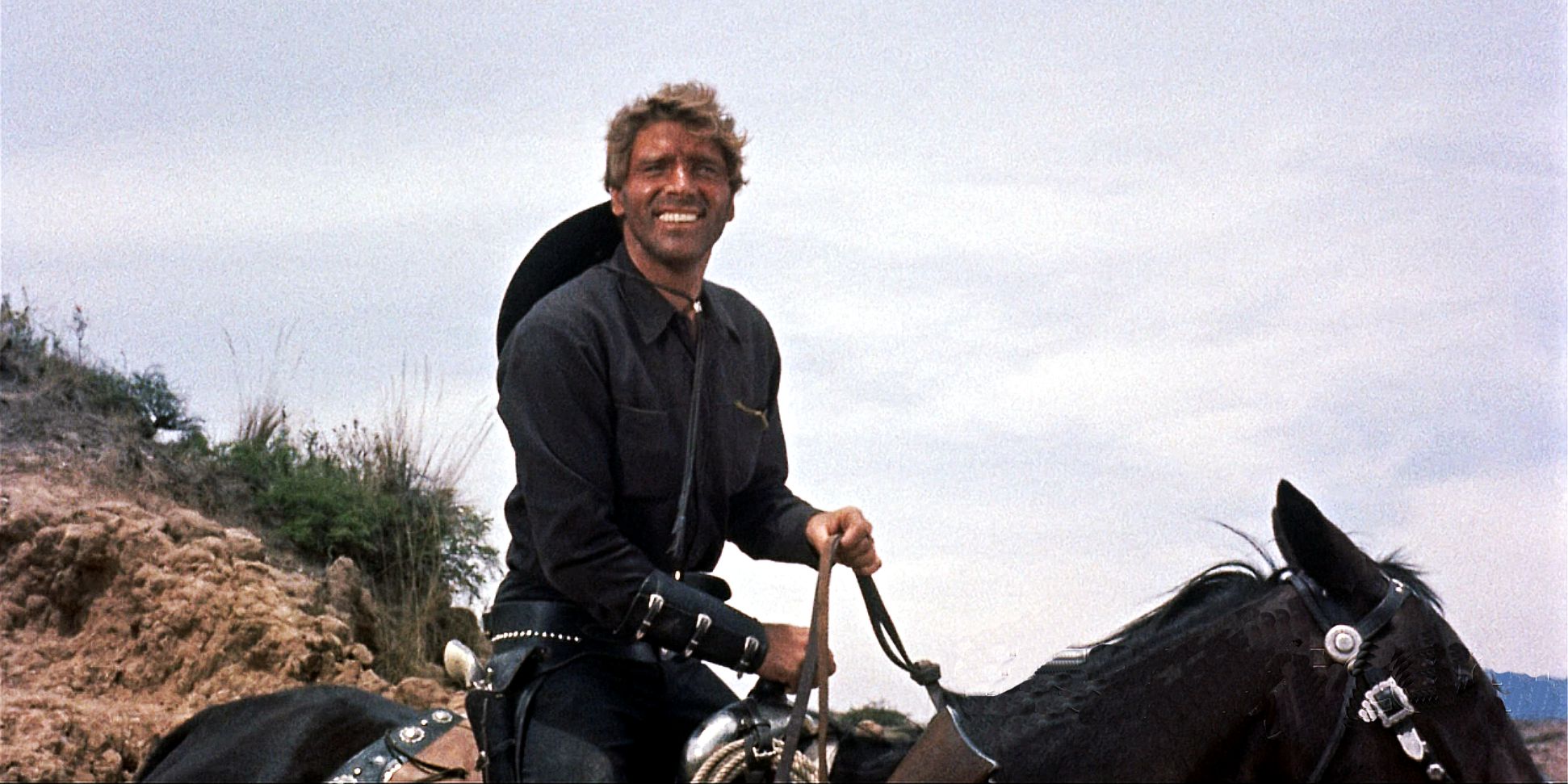Typical Western heroics are tempered with nods to paternal US intervention and CIA-style meddling in Robert Aldrich’s 1954 western Vera Cruz (screening at the Charles on July 27, 29, and Aug. 1), its grim view of history and progress made immediately clear. “As the American Civil War ended, another war was just beginning. The Mexican people were struggling to rid themselves of their foreign Emperor—Maximilian,” a rustic, yellow font scrolling up the screen explains in the prologue. “Into this fight rode a handful of Americans—ex-soldiers, adventurers, criminals—all bent on gain. They drifted South in small groups—and some came alone.”
The bent-on-gain loners here are mercenaries Ben Trane (Gary Cooper) and Joe Erin (Burt Lancaster). Trane wears white and Erin wears black, which doesn’t mean too much in terms of “good guy” and “bad guy” because we learn Trane fought for the Confederacy and Erin for the Union and both team up and take cash from supporters of the French occupation of Mexico, assisting further attacks on Benito Juárez’s Juaristas. Indeed, Vera Cruz‘s characters get in it for the money and end up doing some broader political disruption here—the kind the United States still refuses to reckon with, as the neoliberal coup going on in Venezuela and the cruel sanctions imposed on Iran illustrate.
Why you would go to to a theater and see Vera Cruz or most westerns like this—gruff, cruel, violent, and masculine (this one, complete with a rape scene that is choreographed more like a dance)—I do not know. It’s supposed to be a film critic’s job to convince you to endure some classic, and I won’t exactly do that but look: There is a great deal to glean from Vera Cruz about current and past politics, and this movie does a better job smuggling in complex politics than most contemporary prestige pictures that straight tell all of us liberals what we want to hear about our cruel country.
 Gary Cooper, Sara Montiel, Denise Darcel and Burt Lancaster in Vera Cruz (1954)
Gary Cooper, Sara Montiel, Denise Darcel and Burt Lancaster in Vera Cruz (1954)
If you are so inclined, watch Vera Cruz for: Nina (Sara Montiel), the undercover Juarista and Trane’s love interest who Aldrich presents as a femme fatale on a global scale, seducing Trane and symbolically seducing the US, making revolution alluring; the Juaristas themselves, who are depicted with the same scrappy, radical fervor you see in, say, The Battle Of Algiers; and the way Aldrich’s camera sprints after our “heroes” or glides across Mexico’s landscape occasionally caught up in its beauty, a respite from an unforgiving narrative.
Then there is Burt Lancaster’s big white teeth almost glowing from his dirt-smudged face, a dastardly American grin. There are millions of ways to ruin another country—Vera Cruz shows you one.
 Still from Stephanie J. Williams’ Lingering Survival of the Unfit (With Preamble)
Still from Stephanie J. Williams’ Lingering Survival of the Unfit (With Preamble)
A circuitous and visceral visual metaphor for the physical labor it takes to immigrate, Stephanie J. Williams’ Lingering Survival of the Unfit (With Preamble), at the Walters Art Museum as part of the Sondheim Artscape Prize finalist exhibition through Aug. 11, is a stop-motion short in which two or three balut (fertilized and fermented duck eggs), all muscle, metal mechanical parts, and stringy veins dangling off of them, walk together on a circular platform that spins backward, struggling with each step to go forward. Looping audio, occasionally slowed down or stretched-out, repeats the phrase “so they leave you alone”—the reason many give for crossing “the border” or a border, a fraught concept altogether, to be clear. (“The border divides the whole world into gated communities and prisons, one within the other in concentric circles of privilege and control,” Crimethinc writes in No Wall They Can Build.)
Lingering Survival of the Unfit contains the experiences of Williams’s grandfather, who survived the Bataan Death March in the Philippines, and the millions of migrants currently making nearly impossible treks to this country for a better life—and sometimes, just a life at all. Usually, they are escaping countries American imperialism has ruined thanks to extraction, war, sanctions, and coups, only to be told “no” at every turn on their way here, and then on a whole other level once they arrive.
The voice saying “so they leave you alone” is Williams’ mother, who Williams interviewed about the Philippines and the larger idea of the so-called “greater” United States’ expanded empire. You hear much more from Williams’ mother in the first four minutes of this eight-minute short, when she speaks and all we see on the screen is black, a testamentary overture before the animation begins.
This short deflects interpretation. It does not make the viewer feel good or even smart for initiating what it could mean. There is, for obvious reasons (mostly Trump-powered whitelash), a lot more Political Art being shown and with it, inevitably, a lot more of the back-patting sort that alleviates guilt. But the creatures here, and in the rest of Williams’ body-horror/body-joy work, remain mysterious and beyond reproach. Occasionally we are treated to close-ups of these creatures’ legs, not marching, just standing, the small threads of string around their thighs like veins stretched out and shuddering, pulsing, spasming. What do you even really do with that?

RIYL: Vera Cruz & Lingering Survival of the Unfit
As will always be the case, in an attempt to counter the very convenient though inarguably movie culture-killing world of streaming, I have limited these recommendations to movies that are available at Baltimore’s nonprofit video rental store Beyond Video (2545 N. Howard St.) and movies that are screening somewhere in Baltimore.
Eraserhead (David Lynch, 1977): With its bleeding chickens and embryonic duck-like baby/monster, David Lynch’s surreal, industrial parenthood parable offers a visual analogue for Williams’ Lingering Survival of the Unfit. Screening Wednesday, July 31 and Sunday, Aug. 4 at The Senator.
The Hired Hand (Peter Fonda, 1971): A hazy, lazy, legitimately pretty feminist Western about a cowboy who comes back home to his wife after years cowboyin’ it up and somewhat cops to his screw-ups and agrees to, as the title says, be her hired hand for a while rather than her husband. If you don’t like Westerns, watch this one.
The Leopard (Luchino Visconti, 1963): An opulent elegy for extreme wealth starring Burt Lancaster’s teeth. Watch as the moneyed lose it all to a new kind of bourgeoisie on an actual count and avowed Marxist Visconti’s own personal and brutal terms.
Ride Lonesome (Budd Boetticher, 1959): A sparse, harsh little Western masquerading as widescreen epic with a pulp-meets-Beckett plot: A bounty hunter transporting a killer actually has it out for another killer altogether and all turn out to be bait. Screens on Saturday, Aug. 10, and Monday, Aug. 12 at The Charles.
Sicario (Denis Villeneuve, 2015): A very reactionary movie about US-brewed border chaos that I think too many have misread by assuming we’re to think the CIA bro in sandals played by Josh Brolin (who once played George W. Bush in a movie, btw) is someone spouting drug war common sense rather than imperialistic nonsense.






